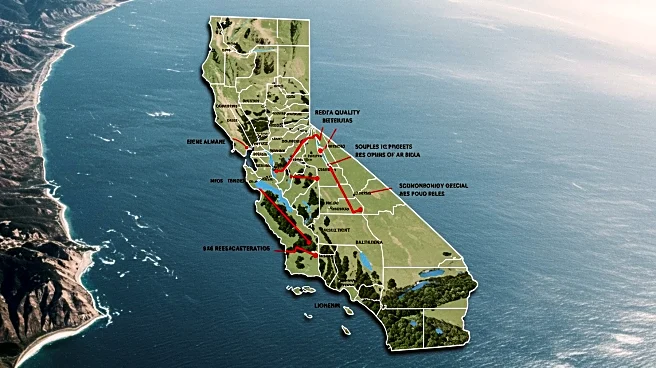What's Happening?
California Governor Gavin Newsom has announced a plan to redraw the state's congressional maps in response to a Republican-led redistricting effort in Texas. The plan, known as the election rigging response act, aims to counter Texas's attempt to secure additional House seats for Republicans. Newsom's proposal would override California's independent redistricting commission, drawing new congressional lines to neutralize Texas's initiative. The announcement was made at the Japanese American National Museum's National Center for the Preservation of Democracy, symbolizing the importance of democratic principles. Newsom, alongside congressional Democrats and legislative leaders, emphasized the need to protect democracy from partisan gerrymandering. The plan will be put to a vote in a special election scheduled for November 4.
Why It's Important?
The redistricting plan proposed by Governor Newsom is significant as it represents a direct challenge to partisan gerrymandering efforts in Texas, which could impact the balance of power in the U.S. House of Representatives. By countering Texas's initiative, California aims to prevent the erosion of democratic processes and ensure fair representation. The move highlights the ongoing national debate over redistricting and its implications for electoral fairness. If successful, the plan could set a precedent for other states to follow, potentially influencing the political landscape across the country. The initiative also underscores the tension between state and federal authorities regarding election integrity and democratic governance.
What's Next?
The proposed redistricting plan will be subject to a special election on November 4, where California voters will decide its fate. If approved, the new map will remain in effect through the 2030 elections, after which mapmaking power would return to the independent commission. The plan's success could prompt other states to adopt similar measures, leading to a broader national conversation on redistricting practices. Meanwhile, Texas Democrats, who had previously blocked a vote on the measure by fleeing the state, are expected to return, allowing Republicans to advance their redistricting efforts. The outcome of these initiatives will likely influence future legislative and electoral strategies.
Beyond the Headlines
The redistricting efforts in California and Texas reflect deeper political and ethical challenges surrounding electoral fairness and representation. The use of partisan gerrymandering raises questions about the integrity of democratic processes and the potential disenfranchisement of voters. The situation also highlights the role of state governments in shaping national politics and the importance of maintaining checks and balances within the electoral system. As states navigate these complex issues, the broader implications for American democracy and governance remain a critical concern.










